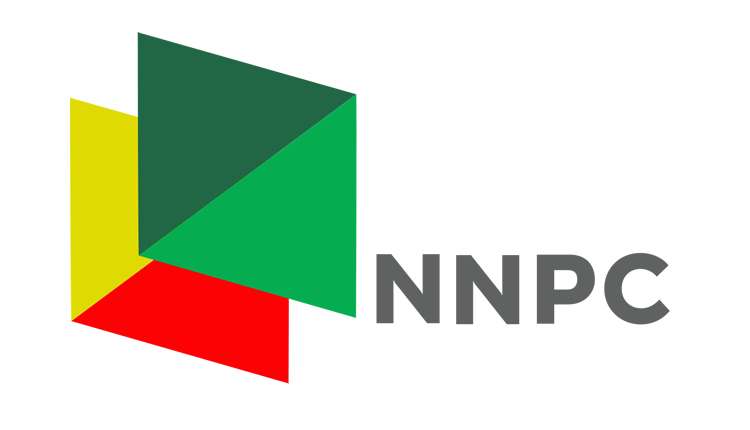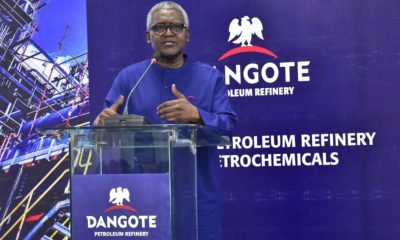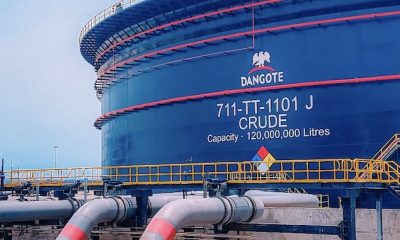
News
Nigeria Owes NNPCL N4.56T on Fuel Subsidy

(iexclusivenews) – The Nigerian National Petroleum Company Limited (NNPCL) has reported to the Federal Account Allocation Committee (FAAC) that it is owed N4.56 trillion for selling petrol at subsidized prices between August 2023 and June 2024.
This information was revealed in documents from FAAC meetings held in July and August, which were reviewed by Nairametrics.

NNPCL Unrecovered Funds from Exchange Rate
According to a report from a FAAC Post-Mortem Sub-Committee (PMSC) meeting, the outstanding amount is due to unrecovered funds arising from exchange rate differentials on Premium Motor Spirit (PMS) importation.
The report stated, “During the last FAAC Plenary meeting, the Sub-Committee reported that NNPCL claimed that the Federation was owing an unrecovered sum of N4,344,519,176,167.32 as of May 2024 Federation Account arising from Exchange Rate Differentials.
This amount has increased to N4,558,597,379,030.6 as of June 2024.”

Reconciliation efforts are ongoing to resolve the outstanding balance.
The Chairman of the Revenue Mobilization Allocation and Fiscal Commission (RMAFC), who presided over the subcommittee meeting, has formally requested detailed information from NNPCL management.
This includes the volume of PMS imported, the pricing structure, and sales values to substantiate the weighted exchange rate applied in the billing.
The report noted, “Accordingly, reconciliation is ongoing; however, the Chairman of the Commission, who chaired the meeting, had written to NNPCL management requesting the volume, price, and sales value to justify the weighted exchange rate.”
RELATED: NNPCL Restores Oil Production of 275,000 bpd at TotalEnergies
NNPCL Claim Raises Concern
The NNPCL’s claim has raised concerns among the commissioners of finance from various states, prompting calls for further clarity and accountability.
During the meeting, the Commissioner of Finance from Akwa Ibom State sought clarification on the massive debt claimed by NNPCL and inquired about potential resolutions to the financial burden.
The Accountant-General of the Federation (AGF) and a representative from NNPCL responded during the meeting.
A copy of the minutes of the meeting seen by Nairametrics read;
“Responding, the Accountant-General of the Federation (AGF) recalled that the matter was discussed at the FAAC Technical Session, held earlier in the day and the representative of NNPC Ltd explained that the company had approval to apply the ‘weighted average rate’ on PMS transactions in order to maintain its current price. She stated that the representative of NNPC Ltd also explained that, if the ‘floating rate’ was to be applied, the price of PMS would be higher than the current price.”
The representative of NNPC Ltd informed members that there was a Federal Government directive that the ex-depot price of PMS be kept at N524.99 per litre.
He explained that for the company to sell at that price, it must obtain Forex at N600/$, which was not the case.
Calls for Transparency and Independence
The Commissioner of Finance from Delta State expressed concerns about NNPCL’s decision to source U.S. dollars for transactions, particularly when the crude oil being sold was already denominated in the same currency.
He emphasized the need for NNPCL to be more transparent and accountable in its operations.
Additionally, the Commissioner of Finance from Bayelsa State suggested that NNPCL should operate more independently as a corporate entity.
He argued that this would allow the company to manage its transactions without frequent recourse to the Federation Account.
Although President Bola Tinubu announced the removal of fuel subsidies during his inaugural address on May 29, 2023, there have been strong indications that the government still spends significant amounts on subsidizing petrol.
The ongoing discussions and reconciliation efforts aim to address the financial implications of these subsidies and ensure greater transparency in NNPCL’s operations.




























